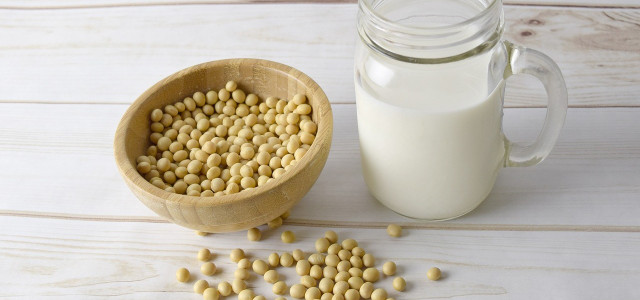Soy causes plenty of controversy. Does it replicate female sex hormones? Is it safe for children? Let's separate myth from fact and find out how healthy soy really is.
Soy might look like an unassuming legume, but it seems to polarize opinions when it comes to its nutritional value. Some exalt it as a health food that reduces menopausal hot flushes, keeps osteoporosis at bay and even protects against hormonal cancers, but others are warier. Furthermore, it’s been shunned in certain studies for exacerbating breast cancer risk, causing hormonal problems in children as well as thyroid problems and even dementia.
But, what are we to believe? Should you pick a side in the great soy debate? Let’s find out.
What Is Soy?
Soy is a legume in the same family as beans, peas, lentils and peanuts. It comes in small pods, like peas, and is native to Asia, where it has been manufactured into various products for thousands of years. Nowadays, soy is grown worldwide, and its products are everywhere.
Soy is a high-quality protein, otherwise known as a complete protein, making it a popular addition to vegan and vegetarian diets. Protein aside, soybeans contain substances called phytoestrogens that mimic the action of the female hormone estrogen. This hormone-mimicking effect has caused some to question the health benefits of soy and soy products.
Possible Positive Health Effects
Soy and soy products contain valuable vegetable proteins, vitamins (provitamin A and vitamin B complex) and unsaturated fatty acids (including the healthy omega-3 fatty acid). They are also rich in minerals such as potassium, magnesium and iron. Studies suggest that a soy-rich diet can alleviate symptoms of menopause. In addition, soy protein is said to keep arteries healthy.
Studies have shown that women who consume soy products regularly are less likely to be diagnosed with breast cancer. One study found that women averaging one cup of soy milk or around half a cup of tofu daily are 30 percent less likely to develop breast cancer than women who eat little or no soy.
The cancer-busting benefits have also been seen to reduce the risk of dying for patients who already have breast cancer. Researchers found that the people with estrogen-negative breast cancer who ate the highest amount of soy isoflavones had a 21 percent lower risk of dying from their cancer than those who ate the lowest amount.
A protective effect has also been observed for both pre-and postmenopausal cancers, and soy foods have been found to reduce the risk for other cancers, too, including colon, lung, endometrial, ovarian and prostate.
Possible Negative Health Effects
Part of the uncertainty of whether soy products are healthy is due to the intricacy of soy’s effects on the body. Soy is unique in that it contains a high concentration of isoflavones, a type of plant estrogen (phytoestrogen) similar in function to human estrogen but with much weaker effects. Soy isoflavones can bind to estrogen receptors in the body and cause either weak estrogenic or anti-estrogenic activity.
The extent to which this affects the organism is highly controversial. Some studies claimed that excessive soy consumption could result in early puberty in girls, thyroid problems and even a heightened risk of certain cancers. But it turns out many of these studies were performed on animals, who may process soy differently than humans.
More recent studies have shown that these preconceptions about soy products were misleading. When researchers studied 327 young and adolescent girls, they found no relationship between soy consumption and the lower age of puberty. A recent review of 41 studies found no apparent effect of hormonal disturbance due to soy protein or isoflavone intake. Studies in men and women have shown that soy does not affect fertility. So far, there is no reliable evidence of a positive or negative health effect from isoflavones.
Clinical trials show that soy products do not affect the thyroid in healthy people. However, soy isoflavones may bind to iodine, which the body uses to make thyroid hormones. In theory, people who consume soy might need slightly more iodine in their diets.
How Nutritional Are Soy Products?



(Foto: Photo: CC0 Public Domain / Unsplash - Johny Goer)
Soy products are nutritionally well-rounded when consumed as “whole” as possible. Of course, it’s difficult to give a broad yes or no, as soy products could house other ingredients that impact their nutritional value. Here are a few of the most common soy products and a quick outline of how healthy they are.
Tofu: Tofu is made from soybeans in a process similar to cheese production. Soy milk curdles, the liquid is squeezed out, and a solid block remains. The most noteworthy feature of tofu is its high protein content. This makes it an important ingredient for those who opt for a purely plant-based diet. With just 100 grams of tofu, you can cover about a third of your daily protein needs. Tofu provides your body with valuable vitamins and minerals and contains secondary plant compounds like iron, phosphorus, folic acid, magnesium, B vitamins, vitamin E and isoflavones.
Soy milk: Soy drink contains around two percent less fat than whole milk (3.5 percent) and slightly more than low-fat cow’s milk (1.5 percent). At three to four percent, the protein content is about as high as that of cow’s milk, but the proteins from the milk substitute are considered to be somewhat easier for the human body to utilize. Soy milk also contains saponins and flavonoids, secondary plant substances that are said to have a positive health impact. The calcium and vitamin B2 content is somewhat low, which is why it is often artificially added. Compared to cow’s milk, soy milk lacks cholesterol, vitamin B12 and vitamin C.
Also interesting: What Is the Best Plant-Based Milk
Soy sauce: Some of the ingredients of soy sauce can be problematic for certain groups of people. The amount of salt in soy sauce can be high, depending on the amount consumed. The USDA Food Database states that 100 grams of shoyu soy sauce contains about 5.5 grams of sodium. For tamari sauce, it’s 5.6 grams. These amounts are almost the recommended daily allowance for table salt. Too much salt in food can result in high blood pressure, which can lead to cardiovascular disease and an increased risk of stroke.
Edamame: Edamame are young soybeans. Predictably, the soy products which are the least processed are the healthiest. Edamame contains high amounts of several vitamins and minerals, as well as fiber. A cup (160 grams) of cooked edamame provides around 18.4 grams of protein.
Is Soy Bad for the Environment?



(Foto: Photo: CC0 Public Domain / Unsplash - Engin Akyurt)
Soy is often grown in large monocultures using genetic engineering. Rainforests are cleared and destroyed to make way for soy cultivation. That said, soy is a legume. Legumes can improve the soil by supplying it with nutrients. So growing soy has advantages and disadvantages.
Large-scale soy cultivation is mainly used to produce animal feed which is heavily relied upon in factory farming. In other words, most soy goes toward making meat and other animal products — not tofu or soy milk. A standard diet requires more land for soy cultivation than a plant-based diet, which is one of the main reasons meat has a significantly worse ecological footprint than tofu. Considering the US is one of the leading global producers of soybeans, you shouldn’t have much trouble finding soy products made with home-grown soy.
House Foods, for example, is a widely available brand that uses 100 percent US-grown, non-GMO soybeans. Hodo is another great organic brand that uses US-grown soybeans. You can find Hodo products nationwide in Publix, Target, Walmart and Whole Foods, among other stores. When shopping, be a mindful consumer and pay attention to the origin of the products you purchase.
Here, as is often the case, ‘the dose makes the poison.’ Modern studies seem to confidently point to soy having either a beneficial or neutral effect on health. Still, of course, moderation is key — particularly when consuming processed soy products such as soy sauce. When consuming soy products in moderation, health consequences in adults are unlikely.
Read more:
- Is Soy Sauce Bad For You? 5 Tips on Finding the Healthiest Option
- Soy Milk vs. Almond Milk for the Planet and You
- Oat Milk vs. Soy Milk: Which is Better for You and the Environment?
- Soy Milk For Toddlers: Is It Safe?
Important Information regarding Health-related Topics.
** Links to retailers marked with ** or underlined orange are partially partner links: If you buy here, you actively support Utopia.org, because we will receive a small part of the sales proceeds. More info.Do you like this post?







